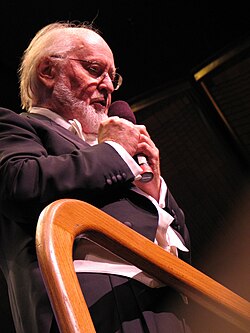| Theme | Description | Scores heard in |
|---|
| Hedwig's Theme [4] | The dominant theme closely identified with and prominently used in all eight Harry Potter films. Though titled "Hedwig's Theme", it does not always specifically represent Hedwig, but rather the wider idea of magic and the Wizarding World franchise. Its concert suite is frequently performed by musicians and ensembles. | The Philosopher's Stone, Chamber of Secrets, Prisoner of Azkaban, Goblet of Fire, Order of the Phoenix, Half-Blood Prince, Deathly Hallows – Part 1 and Deathly Hallows – Part 2 |
| Family Portrait | Represents Harry's parents and his new family in Hogwarts. | The Philosopher's Stone, The Chamber of Secrets, and The Deathly Hallows – Part 2 (Tracked) |
| Harry's Wondrous World | Associated with Harry and his friendships with Ron and Hermione. | The Philosopher's Stone, The Chamber of Secrets, The Half-Blood Prince (recording sessions only) and The Deathly Hallows – Part 2 (Tracked) |
| Nimbus 2000 | Associated with the Nimbus 2000, flying, and mischief. | The Philosopher's Stone, The Chamber of Secrets, The Prisoner of Azkaban and The Deathly Hallows – Part 2 |
| Voldemort's Theme | A two-part theme associated with the main antagonist, Lord Voldemort | The Philosopher's Stone and The Chamber of Secrets |
| Philosopher's Stone | Associated with the Philosopher's Stone and used to represent Voldemort in The Chamber of Secrets. | The Philosopher's Stone and The Chamber of Secrets |
| Diagon Alley | Represents Diagon Alley as a setting. | The Philosopher's Stone (album only) and The Chamber of Secrets |
| Hogwarts Forever | A thematic representation of Hogwarts | The Philosopher's Stone |
| Quidditch Fanfare | Represents the commencement of quidditch matches. | The Philosopher's Stone and The Chamber of Secrets |
| Christmas at Hogwarts | Associated with the arrival of winter and Christmas. | The Philosopher's Stone and The Chamber of Secrets |
| The Dark Forest | Represents the Dark Forest as a setting. | The Philosopher's Stone and The Chamber of Secrets |
| The Flying Keys | Represents flying magical objects and creatures; such as the flying keys in the first film, and Cornish Pixies and the bludger in the second film. | The Philosopher's Stone and The Chamber of Secrets |
| The Banquet Fanfare | Music used during banquet scenes. | The Philosopher's Stone and The Chamber of Secrets |
| The Great Hall Fanfare | Theme associated with the discovery of the amazing wizarding world. Used for the discoveries of Diagon Alley (in the movie), Hogwarts and the Great Hall (and during the sorting of Hermione). | The Philosopher's Stone |
| Ron Weasley's Motif | Whimsical theme used to represent the lightness of Ron. | The Philosopher's Stone and The Chamber of Secrets |
| Weasley's Family | Comical theme heard during family scenes, notably the train station scenes. | The Philosopher's Stone and The Chamber of Secrets |
| Comical Theme | Used for Hagrid's dragon and Ron's eat slugs curse. | The Philosopher's Stone and The Chamber of Secrets |
| Revelation Theme | Used with the first appearance of the Chessboard Chamber and the Chamber of Secrets. First heard when Filch and Snape discover that someone was in the restricted library in the first movie. | The Philosopher's Stone and The Chamber of Secrets |
| The Sneaking Around Theme | Heard with the first appearance of Dumbledore out of the mist; the Golden Trio visiting Hagrid in the middle of the night; the approach of the flying car; and Harry finding Nearly Headless Nick & Justin Finch-Fletchley petrified. | The Philosopher's Stone and The Chamber of Secrets |
| Dursley's Theme | Comical theme associated with the Dursleys. | The Philosopher's Stone and The Chamber of Secrets |
| Ghosts' Motif | Music heard when the ghosts appear. Also used in Moaning Myrtle's theme. | The Philosopher's Stone and The Chamber of Secrets |
| Invisibility Cloak Theme | Associated with the cloak during its use in the first two films. Also used when Harry is writing to Tom Riddle in the diary, and when Tom starts explaining to Harry the strange events that happened during school year in the second film. Heard very briefly in the third film when Harry puts on the cloak in the Honeydukes cellar. | The Philosopher's Stone, The Chamber of Secrets and The Prisoner of Azkaban |
| Fluffy's Harp | Music played by the harp in the first film, which was the instrument used to put Fluffy to sleep. | The Philosopher's Stone |
| Leaving Hogwarts | Music played when Harry gets on the train. | The Philosopher's Stone, The Chamber of Secrets and The Deathly Hallows – Part 2 |
